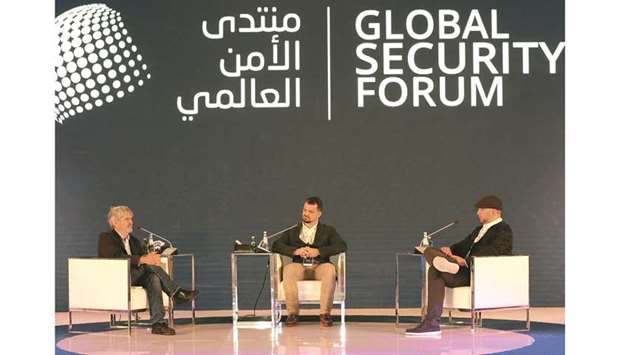The three-day 4th Global Security Forum, which was held via video-conferencing and in-person under the theme 'Co-operation or Competition Changing Dynamics of Global Security', concluded on Thursday. The forum in Doha, which was attended by local and international official figures, UN representatives, officials, security experts, academics, and the media, focused on the need to strike a balance between co-operation and competition to ensure security and address important challenges related to management and development issues and the rapidly evolving geopolitical dynamics.
The three-day 4th Global Security Forum, which was held via video-conferencing and in-person under the theme 'Co-operation or Competition Changing Dynamics of Global Security', concluded on Thursday.
In the session on 'Disinformation and Conspiracies: Assessing Threats and Risks on the Internet', speakers addressed the risks of spreading misinformation and conspiracies in cyber-space, and the potential effects on social cohesion, politics, and security. In the session on 'Security and Development Dynamics in the Middle East and North Africa', speakers discussed the social, political, and economic challenges faced by many Arab countries during the past year, as they reviewed developments in the region over the past decade, especially the development of the work of the civil non-military society.
On the topic of terrorist threats and online responses, and the role of information and communication technology in this field, speakers addressed the risks posed by misinformation and online conspiracies, and the role of Internet and communication technologies, social media companies, and governments in confronting these threats. Regarding security, competition, and co-operation in Asia and the Pacific, the participants exchanged the complex and interrelated challenges faced by countries including the climate, the coronavirus (Covid-19) pandemic, and the risks of violent extremism, from South to Southeast Asia, and the Pacific region.
In the closing session, which was held under the title 'Security and Development Dynamics in Africa', speakers discussed the spread of extremist entities in several countries in the Middle East and Africa, which has exacerbated existing security and development challenges, intersecting with local conflicts.
The session focused on the challenges facing the region and the impact of terrorism and violent extremism on security and governance, especially in light of the spread of the pandemic. The forum was organised by the Soufan Centre in co-operation with the Qatar International Academy for Security Studies (QIASS), Hamad bin Khalifa University (HBKU), Nordic Safe Cities, the Erie Neff Fund, New America, Defence One, and the UN Security Council's Counter-terrorism Committee.
The three-day 4th Global Security Forum, which was held via video-conferencing and in-person under the theme 'Co-operation or Competition Changing Dynamics of Global Security', concluded on Thursday.
In the session on 'Disinformation and Conspiracies: Assessing Threats and Risks on the Internet', speakers addressed the risks of spreading misinformation and conspiracies in cyber-space, and the potential effects on social cohesion, politics, and security. In the session on 'Security and Development Dynamics in the Middle East and North Africa', speakers discussed the social, political, and economic challenges faced by many Arab countries during the past year, as they reviewed developments in the region over the past decade, especially the development of the work of the civil non-military society.
On the topic of terrorist threats and online responses, and the role of information and communication technology in this field, speakers addressed the risks posed by misinformation and online conspiracies, and the role of Internet and communication technologies, social media companies, and governments in confronting these threats. Regarding security, competition, and co-operation in Asia and the Pacific, the participants exchanged the complex and interrelated challenges faced by countries including the climate, the coronavirus (Covid-19) pandemic, and the risks of violent extremism, from South to Southeast Asia, and the Pacific region.
In the closing session, which was held under the title 'Security and Development Dynamics in Africa', speakers discussed the spread of extremist entities in several countries in the Middle East and Africa, which has exacerbated existing security and development challenges, intersecting with local conflicts.
The session focused on the challenges facing the region and the impact of terrorism and violent extremism on security and governance, especially in light of the spread of the pandemic. The forum was organised by the Soufan Centre in co-operation with the Qatar International Academy for Security Studies (QIASS), Hamad bin Khalifa University (HBKU), Nordic Safe Cities, the Erie Neff Fund, New America, Defence One, and the UN Security Council's Counter-terrorism Committee.

